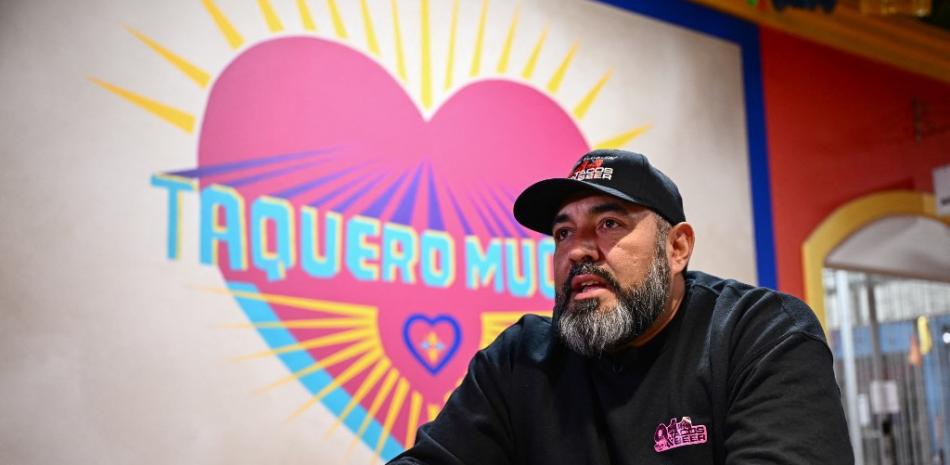Latinos, an electoral group that is beginning to switch parties in the United States

Antonio Muñoz, a former police officer turned restaurateur, feels the political winds are changing in his native Nevada, where a segment of the Latino community, traditionally Democratic, has begun to lean toward the Republican Party ahead of November’s presidential elections.
“I voted Democrat last election, but this year I’m confused, I don’t know what to do,” says the man at his colorful taco shop in Las Vegas.
Biden, 81, will run for re-election in November, possibly against former Republican President Donald Trump, 77, whom he defeated in 2020 and who is campaigning for his party’s nomination.
Despite facing dozens of allegations of election irregularities and other legal charges, Trump leads the Republican primaries.
Early polls also put him ahead of Biden in Nevada, who won the state by a narrow margin in the last election.
Muñoz sees Democratic strongholds in the city still strong. “But I’ve talked to friends who are in the middle like me,” says the 48-year-old, who predicts the state will be the scene of an aggressive campaign with both parties competing for the Latino vote.
Generational change
The Latino community is the fastest growing community in the United States.
“One in five Americans who can vote in this election are Latinos,” explains Mark Hugo Lopez, director of research on race and ethnicity at the Pew Research Center.
Although with regional variations, such as a trend in favor of Republican candidates in Florida, the significant Latino bloc has historically been Democratic, but many are beginning to break with tradition.
In Texas, a state bordering Mexico, Trump scored more electoral victories among Latinos in 2020 than in 2016, Lopez recalled.
“Even in California (a Democratic enclave), a New York Times analysis found a slight drop in the percentage of Latinos who supported Biden compared to Hillary Clinton in 2016,” he said.
“It’s a very diverse landscape, but it looks like Republican candidates like Trump have scored points with Latinos in 2020 in places that are traditionally very Democratic.”
Although it is very early in the election race, polls show that this has not changed with the Democratic administration.
“Joe Biden’s approval rating among Latinos remains low,” Lopez said. Our most recent numbers show that in January, 65% of Latinos were failing their jobs, and 32% were passing.”
With the rapid expansion of the Latino community, a new generation seems to be influencing this change.
“A place like Nevada (…) has a lot of immigrants but also a lot of Americans who are children of immigrant parents, as well as a growing number of third or later generations,” says Lopez. “And they lean more toward the Republican Party than other groups of Latinos.”
Maria Elena Castro, an activist with the NGO Mamas con Poder and identified with the Democrats, notices her son and nephews at home listening to talks about politics.
“Young children don’t know much about the past, what their parents had to go through,” said the 51-year-old Mexican-American.
“Young Latino Vote Favors Republicans Due to Lack of Information.”
“Are we better off?”
For Latinos, the economy and immigration issues are priorities. And they think the Biden administration is guilty of both.
And this is where Republicans have room for action, says Jesus Marquez, a political consultant affiliated with the Trump campaign in Nevada.
Thousands of people arrive at the United States border every day in search of asylum, a situation that has overwhelmed the country’s already overcrowded immigration system.
As a result, Biden is under attack from all sides, with a widespread belief that the border with Mexico is out of control.
“It’s something that Latinos who have lived here for decades don’t like, because they feel like a lot of people are giving up their place in line,” Marquez said.
The issue has become a focal point of the Republican campaign and a headache for Democrats, along with a widespread perception that the economy is in bad shape.
Concerns about maintaining employment and covering basic expenses play a crucial role among voters, but according to recent polls, this negative assessment of the economic situation is more acute among Latinos.
“Latinos, typically working class, struggle with the high cost of living,” says Marquez.
“Latinos remember what they were like recently during the administration of Donald Trump,” he adds. “And the question they’re asking is, are we better off now than when Trump was president?”

:quality(75)/cloudfront-us-east-1.images.arcpublishing.com/elcomercio/SKIHRFQRBRFJ7E27543CKHTQBQ.jpg)
:quality(85)/cloudfront-us-east-1.images.arcpublishing.com/infobae/HENHHNUWPBCQNDOAHQN6NWTIWU.jpg)

:quality(75)/cloudfront-us-east-1.images.arcpublishing.com/elcomercio/LJBL75RHOBCJ7HBWTCDOHUZQ3Y.jpg)
